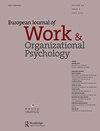服务型领导和客户服务绩效:测试社会学习和社会交换信息激励途径
IF 3.4
2区 心理学
Q2 MANAGEMENT
European Journal of Work and Organizational Psychology
Pub Date : 2023-02-16
DOI:10.1080/1359432X.2023.2178905
引用次数: 0
摘要
摘要基于社会学习和社会交流理论,我们研究了一个中介模型,通过该模型,仆人领导力与客户服务绩效之间存在关联。在两项研究中,我们检验了一线员工以客户为中心的态度(社会学习理论)或对组织的感激之情(社会交换理论)是否调节了仆人-领导-客户服务绩效关系。此外,在研究2中,我们检验了主动性氛围是否构成两个动机驱动因素与客户服务绩效之间关系的边界条件。数据来自韩国(研究1)和台湾(研究2)一线员工的样本。在研究1中,以客户为中心的态度和对组织的感激之情调节了仆人领导与服务绩效之间的关系,但只有对组织的感谢才能调节仆人领导客户导向的额外角色绩效。研究2的结果表明,对组织的感激,而不是以客户为中心的态度,在仆人领导和服务绩效之间起着中介作用。与我们的预测相反,主动性氛围并没有调节这两个动机驱动因素与服务绩效之间的关系。总之,我们的研究结果为社会交换相对于社会学习理论在解释仆人领导的客户服务绩效影响方面的重要性提供了初步证据。本文章由计算机程序翻译,如有差异,请以英文原文为准。
Servant leadership and customer service performance: testing social learning and social exchange-informed motivational pathways
ABSTRACT Drawing on social learning and social exchange theories, we examined a moderated mediation model of the processes through which servant leadership relates to customer service performance. Across two studies, we examined whether frontline employees’ customer-centric attitude (social learning theory) or gratitude towards the organization (social exchange theory) mediates the servant leadership-customer service performance relationship. Additionally, in Study 2, we examined whether initiative climate constitutes a boundary condition of the relationships between the two motivational drivers and customer service performance. Data were obtained from a sample of South Korean (Study 1) and Taiwanese (Study 2) frontline employees. In Study 1, customer-centric attitude and gratitude towards the organization mediate the relationship between servant leadership and service performance but only gratitude towards the organization mediates the servant leadership-customer-directed extra-role performance. The findings of Study 2 reveal that gratitude towards the organization, but not customer-centric attitude mediates the relationship between servant leadership and service performance. Contrary to our prediction, initiative climate did not moderate the relationships between the two motivational drivers and service performance. In sum, our findings provide initial evidence of the importance of social exchange relative to social learning theory in accounting for the customer service performance implications of servant leadership.
求助全文
通过发布文献求助,成功后即可免费获取论文全文。
去求助
来源期刊
CiteScore
8.00
自引率
2.30%
发文量
40
期刊介绍:
The mission of the European Journal of Work and Organizational Psychology is to promote and support the development of Work and Organizational Psychology by publishing high-quality scientific articles that improve our understanding of phenomena occurring in work and organizational settings. The journal publishes empirical, theoretical, methodological, and review articles that are relevant to real-world situations. The journal has a world-wide authorship, readership and editorial board. Submissions from all around the world are invited.

 求助内容:
求助内容: 应助结果提醒方式:
应助结果提醒方式:


